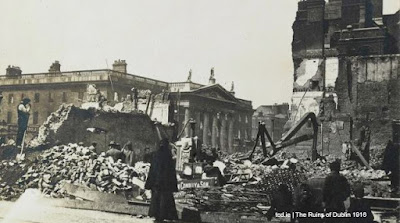For many occurrences in life, it is easy to be wise after the event. Yet, while this Sunday, 24 April marks the passing of 100 years since the start of Ireland’s 1916 Easter Rising, no one can say with any certainty what the men and women behind it should or should not have done.
‘A terrible beauty is born’ is how the great Irish poet, William Butler Yeats, summed up the contrasting emotions of the time. In many ways, it continues to be viewed thus.
It's probably fair to say that had there been a national plebiscite at the time to rebel or not, the latter would have won the day. This is not to say that a majority on the island did not want a change in how the country was governed, more that past experiences of failed uprisings had surely left the populace sceptical that a new attempt would succeed.
 |
| Knocking down the old structures to start anew. (Photo from Facebook.) |
The lack of popular support and indifference that history records when the rising broke out suggest this. (On the democratic front, one can also point to the many occasions when the concerns of the Irish masses were ignored by their colonial masters.)
Yet, it didn't take long for that to change; vindication for the actions of the Rising’s leaders in a sense. However, their stated aim was to achieve an all-island republic; this, of course, did not happen and has not happened.
Taking into account the political developments at Westminster at the time, it seems that some sort of Home Rule would have been granted once World War One was over, with perhaps separate parliaments for both Dublin and Belfast, considering the vehement opposition to the idea in the north-east.
Yet, it didn't take long for that to change; vindication for the actions of the Rising’s leaders in a sense. However, their stated aim was to achieve an all-island republic; this, of course, did not happen and has not happened.
Taking into account the political developments at Westminster at the time, it seems that some sort of Home Rule would have been granted once World War One was over, with perhaps separate parliaments for both Dublin and Belfast, considering the vehement opposition to the idea in the north-east.
In other words, something very similar to the agreement actually reached between Britain and Ireland in the years after 1916. Or it may have even led to a devolved parliament for a united Ireland, remaining part of the United Kingdom albeit.
Therefore, it could be suggested that the rising and subsequent guerrilla war were unnecessary. Moreover, these further deepened the north-south divide.
On the other hand, we can only assume that a solely political path would have led to Home Rule. Diplomacy had failed in the past, which led some to believe that a forceful ‘stick’ approach was needed to get any meaningful concessions from Britain.
It is in this light we have to judge the actions of those who carried out the 1916 Rising. They did what they felt was necessary at the time.
With the benefit of hindsight, you could argue, as some do, that it was the wrong move.
Therefore, it could be suggested that the rising and subsequent guerrilla war were unnecessary. Moreover, these further deepened the north-south divide.
On the other hand, we can only assume that a solely political path would have led to Home Rule. Diplomacy had failed in the past, which led some to believe that a forceful ‘stick’ approach was needed to get any meaningful concessions from Britain.
It is in this light we have to judge the actions of those who carried out the 1916 Rising. They did what they felt was necessary at the time.
With the benefit of hindsight, you could argue, as some do, that it was the wrong move.
Be that as it may, respect must be given to those who made what was for many akin to a suicidal attack on the forces of what they viewed as an oppressive regime.
__________________________________________
Facebook: Wrong Way Corrigan - The Blog & IQuiz "The Bogotá Pub Quiz".
__________________________________________
Facebook: Wrong Way Corrigan - The Blog & IQuiz "The Bogotá Pub Quiz".
No comments:
Post a Comment